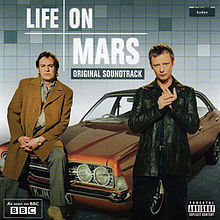
A question that has come up in talking to writers in Poland and also elsewhere recently is the issue of the Series Arc. So what, exactly, is a series arc?. A series arc is an overarching serial plotline that runs for the whole series and which in every episode shows the characters in the series changing in some radical way in response to events. This plotline is resolved and/or turned in a radical new direction in the final episode of the series.
Not all series have a series arc. The Simpsons made its mark by NOT having a series arc and keeping the characters perpetually the same age and in the same situation.
Sometimes series that start out without a series arc and insert one in later seasons.
A very interesting series arc is the one in Life on Mars. Here, the series arc is also the premise - namely, that a detective has an accident and is simultaneously in a coma AND working as a detective decades in the past. Every episode, we see a police crime story set in the past, and we also see serial element consisting of his changing relationships in the past with the people we meet. In addition to these, we see material about his comatose state in the present. He hears voices through the TV set, these voices apparently belonging to people who, decades hence, are standing around his comatose body talking about him and to him. Additionally, he sometimes sees his childhood self.
The advantage of a series arc is that it pulls in audiences and holds them. Its disadvantage is that the end of the season sees the characters significantly changed, so the season that follows has to take on these new changed characters. Sometimes a series arc can seriously damage a series. For example, when Fran in The Nanny finally got her man the comic sexual tension that was so important to the series was lost. A massive change like this can kill a series because it changes it beyond recognition. So think seriously about the impact a series might have before you consider one.
A good coffee break exercise would be to take a genre (like a hospital show) and brainstorm a striking series arc/premise. That way, as in Life in Mars, you get all of the attraction of a genre show PLUS a unique and fascinating premise. You could do this for a genre novel, too.
 RSS Feed
RSS Feed


